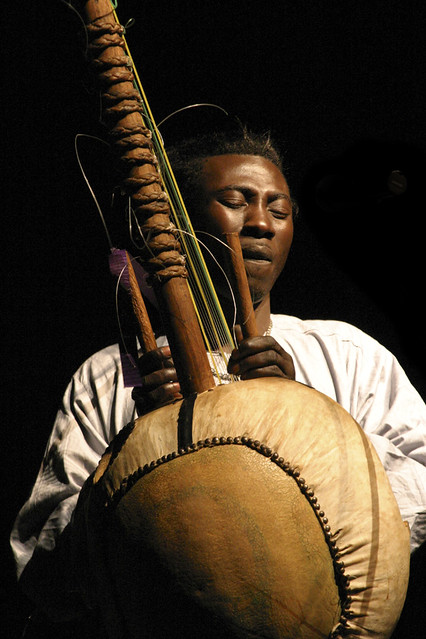 |
| A local boy with an improptu cora instrument. Photographed near Banjul in The Gambia. (Photo credit: Wikipedia) |
Other parts of the African continent were similarly affected by foreign music. Parts of East Africa and the offshore islands were influenced by Arabic music and Indian music. While Southern, Central and West Africa had been influenced by the music of North America and Western Europe. Other African music can be attributed to specific dance forms such as the rumba and salsa, which were founded by African slaves who settled in Latin America and the Caribbean. In this article, we will be exploring the different kinds of African music and where it originated.
North Africa
The music of North Africa was strongly influenced by the music of ancient Egypt and the early Arabs. Although it is one of the least popular forms of contemporary African music, it is historically significant and merits examination by all those interested in traditional music.
Sub-Saharan Music
No music is more purely African than music that originated in Sub-Saharan Africa. Though many regions were influenced by other nations, Sub-Saharan music remains quintessentially African. Because writing and reading came late to parts of Africa, this music was developed as a form of communication. In time, it became an exciting, communal way to celebrate and mark the major milestones in a person's life. For example, there are literally hundreds of African songs that celebrate marriage, childbirth or even hunting parties.
Music is also played to ward off noxious spirits and to pay homage to deceased ancestors. African music of this type is almost always accompanied by a specific dance or ceremony. It is often performed by professional musicians who have experience with ceremonial music.
Because music from Sub-Saharan Africa focused on communal singing, it was one of the earliest to emphasize the use of harmony and structured singing. These singing methods ranged from simple rhythmic structures to incredibly complex and elaborate structures based on improvisation and variation.
Instruments
Though stringed instruments, bells, flutes and even xylophones were all used in traditional African music, there is nothing more important than the basic African hand drum. In fact, there are literally dozens of drums that are played on different occasions. A few of the most popular drums that are used in a traditional African musical include bougarabou, Tama talking drums, djembe, water drums and many different kinds of Ngoma drum that are played in parts of Central and Southern Africa.
These drums are almost always accompanied by singers or choruses who often keep time with rattles, shakers, wood sticks, bells or by simply clapping their hands' or stumping their feet.
|

